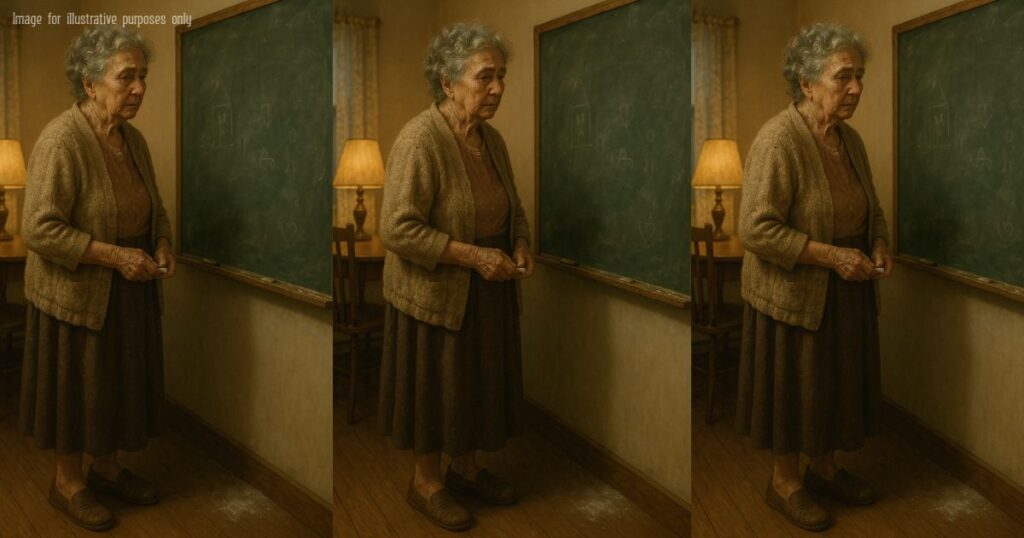The chalkboard stayed up long after the lessons stopped.
Emma had passed her placement test. First grade welcomed her with open arms — and a new teacher, one who let kids show their work with drawings, sticks, and even stories. Margaret never asked whether her letters made a difference. She didn’t have to.
Instead, she watched from the porch each morning as Emma skipped down the sidewalk in scuffed sneakers, lunchbox swinging, hair wild with purpose. The little girl who once said math was “dumb” now helped other kids with it on the playground.
But the house felt different now. Quieter.
The old chalkboard — its surface worn smooth like river stone — stood in the corner of the dining room. Emma still used it now and then, mostly for doodles and messages like “I love Grandma” and crude drawings of their cat wearing glasses. But the rhythm was gone. The rituals. The hum of discovery.
Until one gray morning in November, when Margaret woke to a sharp ache down her left arm.
It was dull at first. Familiar. She’d had twinges before, brushed them off. This one lingered.
She sat at the kitchen table, fingers curled around her coffee mug, and stared out the window as Emma’s laughter echoed from the living room. Then, without fuss, she folded her hand over her chest, closed her eyes, and whispered:
“Not today.”
They called the ambulance anyway. Her daughter panicked, of course. Emma cried, clutching the blanket from the couch. Margaret, always calm, let the medics do their job, but she made sure to speak clearly when they asked about emergency contacts.
“Tell them,” she said between breaths, “the chalk’s still in the drawer.”
The hospital kept her two nights. Nothing severe — just a warning shot, as the nurse called it. She returned home to flowers, soup, and a sticky note from Emma that said:
“NO MORE SCARING ME.”
But something had shifted.
Margaret began writing again.
Not just notes or letters — but real writing. Stories. Lessons. She pulled out her old binders, thick with teaching wisdom and coffee stains, and started typing.
She wrote for the kids who never fit the mold. For the teachers hanging on by a thread. For the grandparents like her — watching the world tilt toward touchscreens and test prep and wondering if there was still room for gentleness.
Emma would sit beside her sometimes, scribbling in her own notebook.
“Grandma,” she said one afternoon, “when I grow up, I wanna teach.”
Margaret smiled. “You already are.”
They began something new then. Not lessons. Not games. Something deeper.
Every Saturday morning, they hosted what Emma called the “Sidewalk School.” It started with just one neighbor boy — Eli, a quiet kindergartner who was scared of loud voices and never raised his hand in class. Then came twins from down the block. Then the mail lady’s niece.
They met under the maple tree in Margaret’s front yard. Margaret brought out the chalkboard. Emma brought the imagination. They taught math and stories and patience and how to ask questions without fear.
No grades. No scores. Just learning. And laughing.
One morning, Margaret sat on the porch swing, a quilt across her lap, watching the children draw shapes in the driveway.
Emma sat at the chalkboard, explaining how subtraction was just giving — not losing.
Margaret’s daughter leaned in the doorway, arms crossed, watching it all unfold.
“You think she’s got it in her blood?” she asked quietly.
Margaret smiled. “No doubt.”
The wind picked up then, scattering a little line of chalk dust across the porch. Margaret watched it dance in the sunlight.
Dust from the board. Dust from decades.
She thought of the children she’d taught, the rooms she’d filled with stories, the soft hush of chalk tapping against slate.
People always thought the dust settled.
But it didn’t.
It carried on the wind. Into notebooks and hearts and little minds that grew up to remember how someone once knelt beside them and said, “Let’s find another way.”
That evening, as the sun dipped behind the roofline and the kids packed up their crayons, Emma turned back toward her grandmother.
“Grandma,” she asked, “when will the lessons stop?”
Margaret reached over, ran her fingers through Emma’s tangled hair, and said,
“They don’t. They just find new voices.”
And from the dining room, through the open window, the chalkboard caught the last golden light — glowing like a memory that refused to fade.
Final Line:
The world may forget the teacher, but it never forgets the lesson whispered in love.


